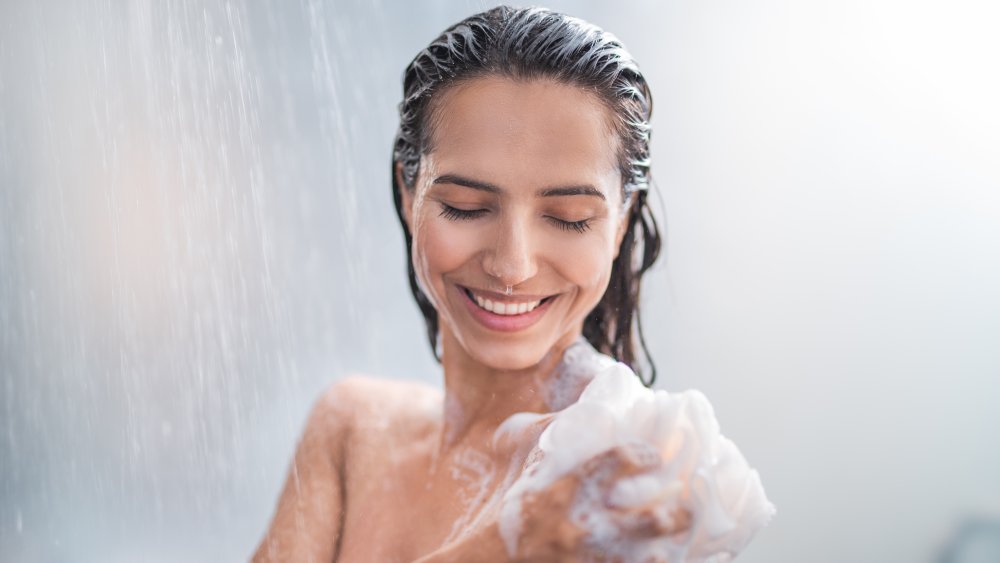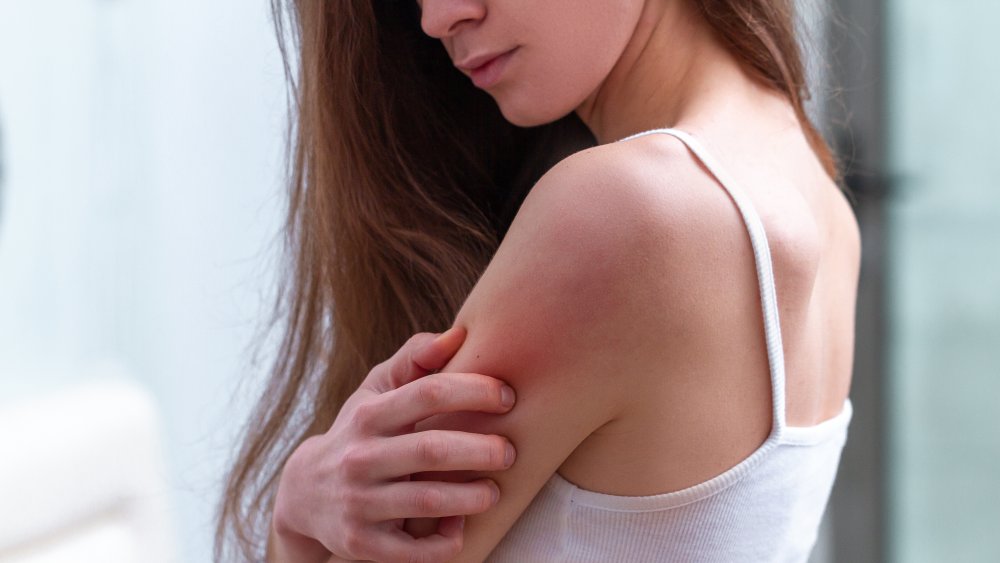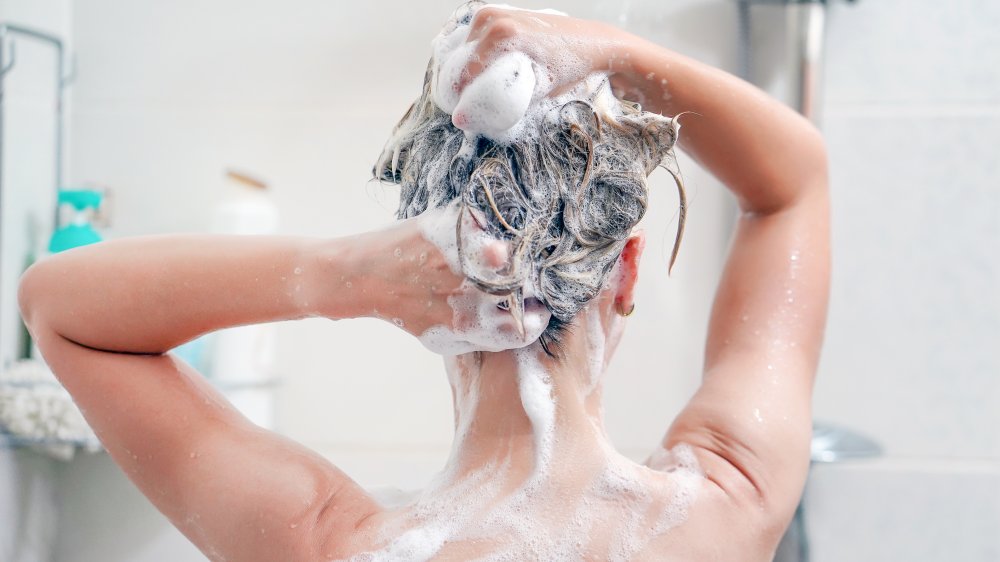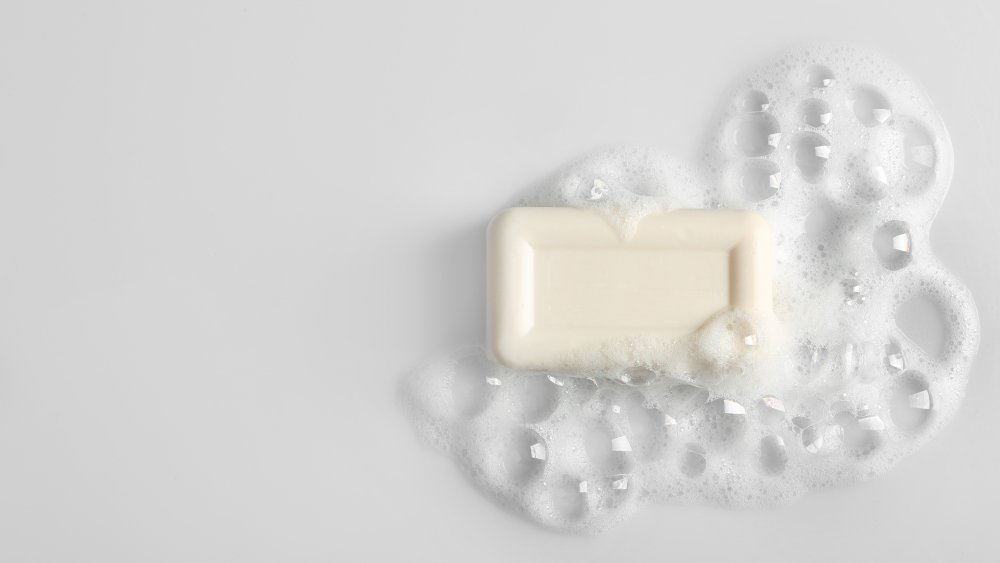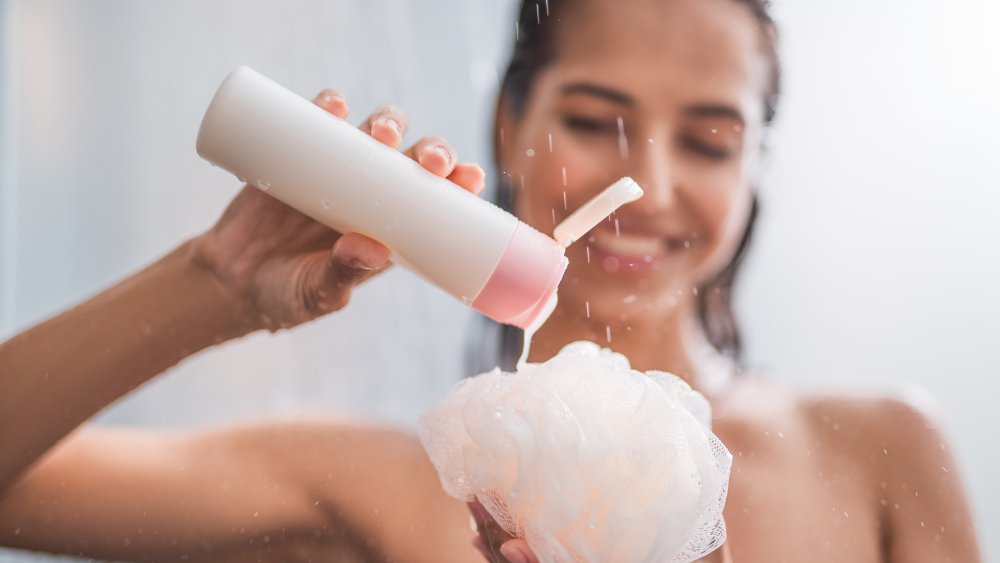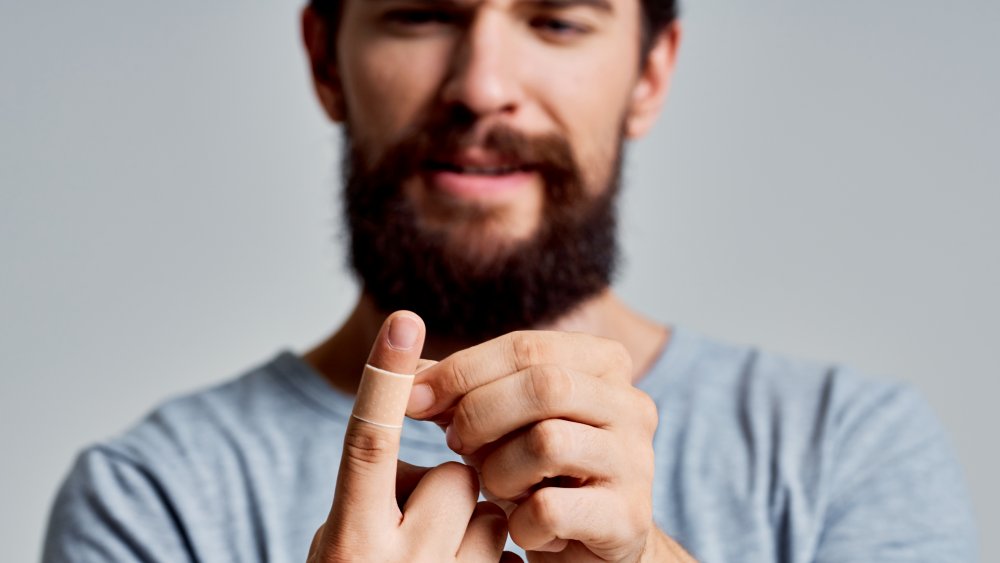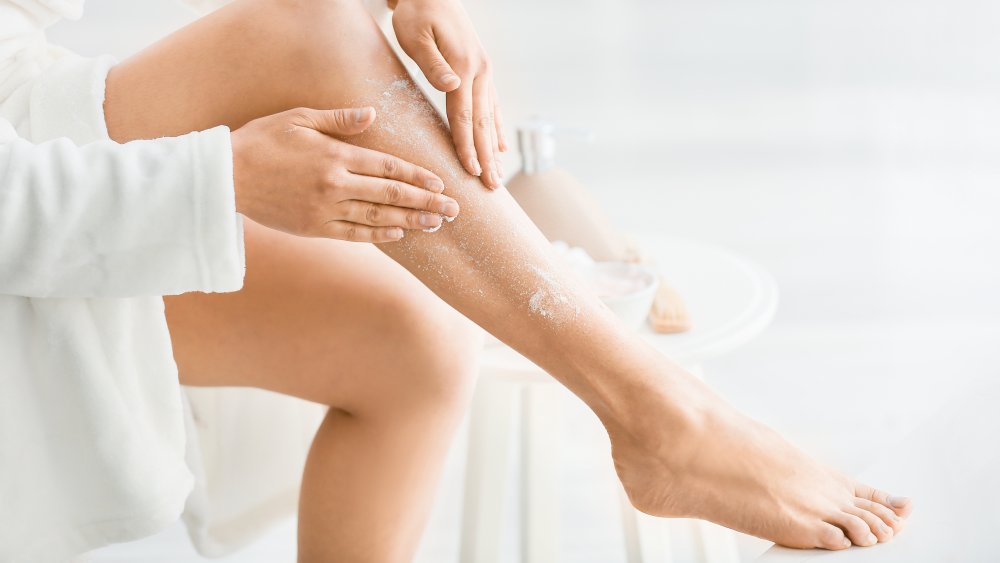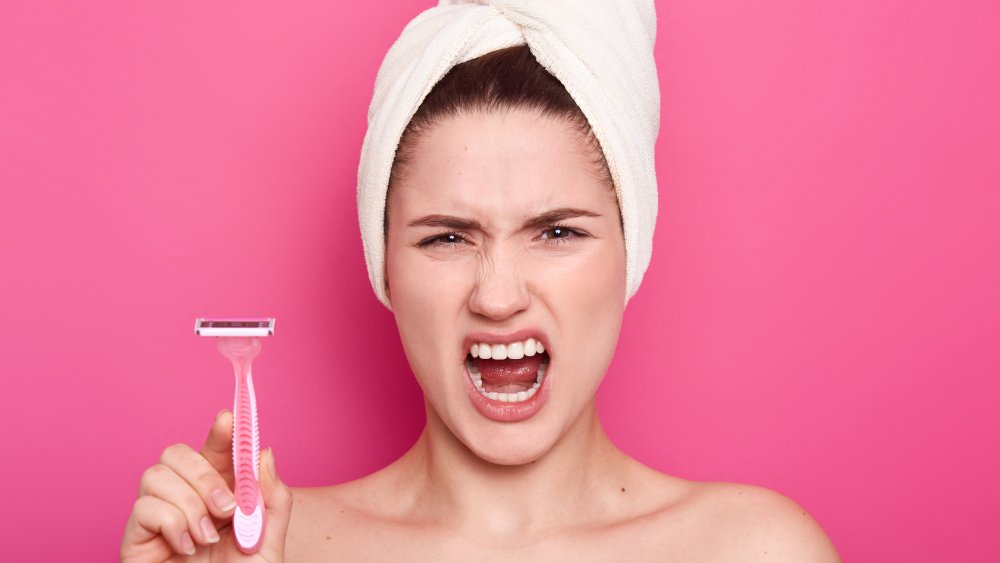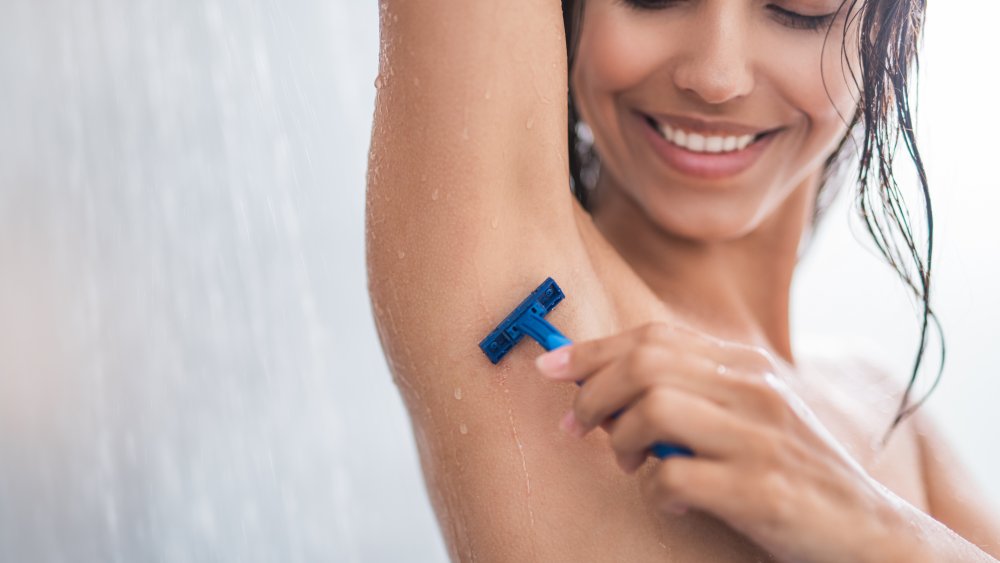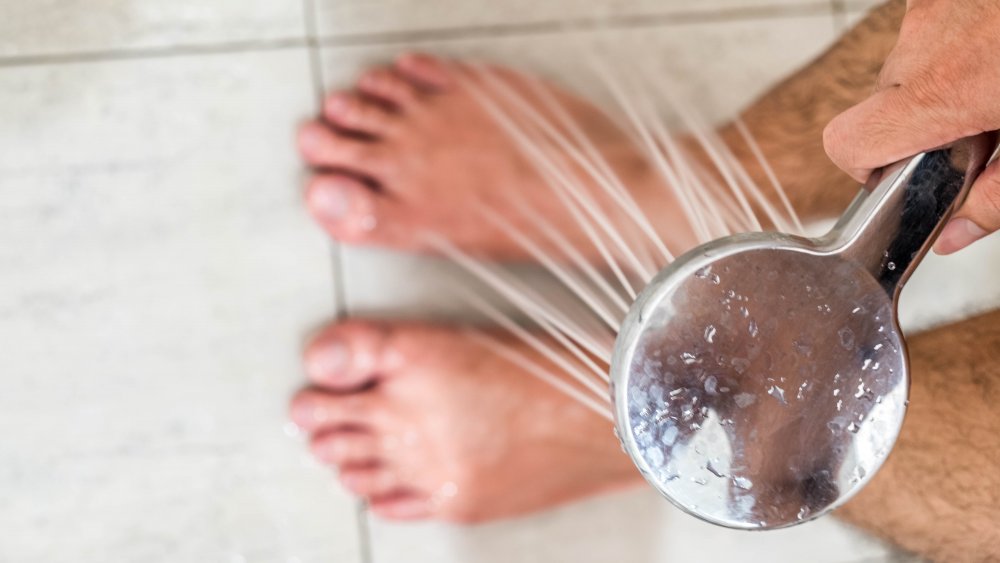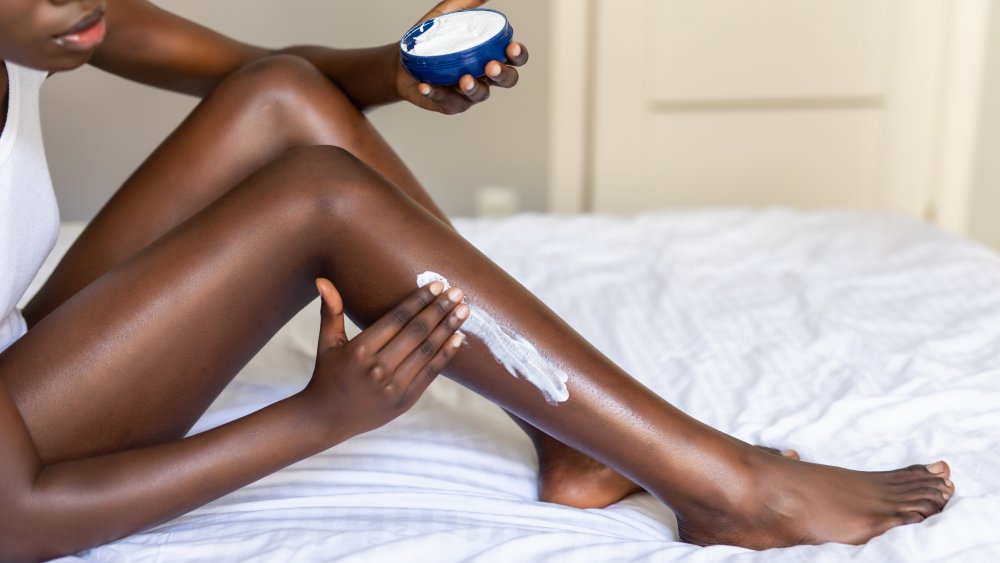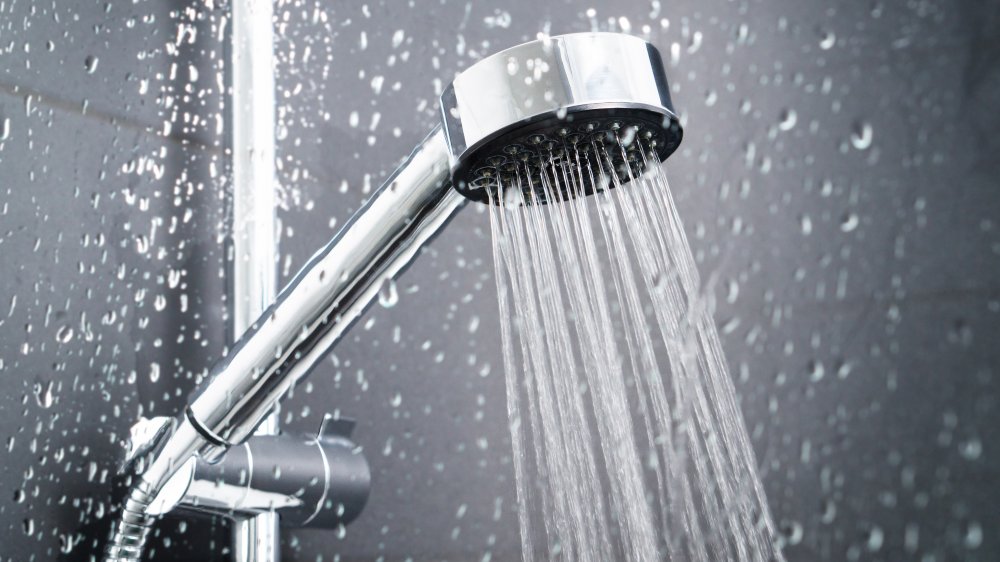Mistakes You Never Realized You Were Making In The Shower
Showering is not exactly a fine art. You have probably been doing it for years and years, and you have your routine down pat: wash your hair, soap up your pits, maybe do some shaving, and towel off. Get in, get out, and try to enjoy the solitude of a hopefully peaceful (but potentially rushed!) shower. Easy breezy, right?
While you may consider yourself a shower expert, the truth is: You could be messing it all up. Yes, there are multiple common mistakes that people make while cleansing, rinsing, and drying themselves.
As it turns out, soap might not be as necessary as you think, your water temperature could be too high, and your loofah is just festering with bacteria (oh, and don't get us started on that germ-ridden shower head).
Want to know what you are doing wrong? Health Digest is breaking it down and sharing all the sudsy do's and don'ts — plus some must-know hygiene habits for your next scheduled shower session.
You are showering too often
We get it. A shower is how you wake up in the morning or how you wind down at night. It can be an invigorating ritual or part of a relaxing routine. Regardless, showering multiple times a day — or even just once daily — might be too much.
As noted by Harvard Health, your skin should have "a layer of oil and a balance of 'good' bacteria and other microorganisms." When you scrub-a-dub-dub your body, you are actually getting rid of all these healthy dermal helpers. And, believe it or not, in addition to causing irritation, it can also harm your immune system, which actually relies on "environmental exposures" to build up those all-important "protective antibodies." So, yes, showering daily might impede your body from attaining some degree of natural immunity.
So how often should you shower? If possible, go with every other day, as recommended by Healthline. But if you need one to feel your absolute best, stick to a daily rinse — just try to keep it short and sweet.
You are showering with water that is way too hot
Sometimes it feels so good to get into a steaming hot shower and rinse the day away. But while that scalding H20 may strip away your stress, it can also strip your skin of essential oils and natural moisture.
Shari Marchbein, a New York City-based dermatologist, told Allure, "Any skin condition characterized by a defective skin barrier can be worsened by a hot shower." Those who have eczema, acne, psoriasis, and rosacea should definitely turn down the water temp. Even if you don't have any such skin conditions, you should still be mindful of the water temperature — especially in the colder months. "We are all more prone to itchy, dry skin as the humidity levels drop and the hot water in showers — as well as hot, dry air from radiators — draws moisture out of the skin," Marchbein told the outlet.
Skin issues aside, a hot shower can also raise your blood pressure, according to Healthline — so those with cardiovascular problems should be extra cautious. And in case you are wondering, the ideal shower temperature should be about 112 degrees Fahrenheit (and no hotter), according to Cleveland Clinic dermatologist Melissa Piliang (via Wall Street Journal).
You are washing your hair too frequently
Want to milk that blowout for another day or two? It may be a smart plan to avoid the shampoo in order to keep your mane looking fresh and fabulous. Washing your hair every day is not only unnecessary, it can leave your strands feeling and looking dry and brittle.
Dr. Angela Lamb, a dermatology professor at Mount Sinai, told WebMD, "Hair produces natural oil called sebum, and shampoo is an emulsifier that captures and traps excess oil, dirt, and product residue, which you then rinse out to clean the hair." But cleansing your hair too often can lead to breakage.
Of course, everyone's hair and scalp is slightly different. According to Medical News Today, those with extremely dry scalps do not make as much natural sebum. As such, it's particularly beneficial for these ones to go a few days in between shampoo sessions to avoid "itching and flaking." On the other hand, those with fine hair or oily roots may find they need to stick with their daily shampoo routine.
You are probably using the wrong soap for your skin
Have you ever looked at the fine print on your favorite shower body wash product? It reads like gibberish with all sorts of unrecognizable ingredients. One thing you shold look to actively avoid though is antibacterial soaps. These variations not only eliminate bad bacteria, they also eradicate the good kind that keeps our immune systems healthy and strong. Furthermore, antibacterial sopas can actually enable antibiotic-resistant bacteria to swoop in, per WebMD.
But what about regular old bar soap? According to Healthline, these products are often chock full of sulfates, parabens, phthalates and artificial fragrances. According to a study published in Dermatology, such ingredients can alter the body's natural pH levels, affect the skin's natural barrier, and cause discomfort.
So what's a sweaty, smelly person to do? If a water-only shower doesn't quite do it for you, we hear you. Instead, try a natural or handmade small-batch soap. These tend to be gentler with rich ingredients like coconut oil or shea butter. You can also use a dry brush to get rid of dead skin cells or try oil cleansing, Healthline revealed.
You are definitely using the wrong soap down there
It is probably rather obvious, but if that bar of soap doesn't cut it for your arms, legs, and booty, it most definitely should not be what you use to clean your, um, more private regions.
The "vagina has a very acidic environment, which naturally protects against bacteria," the Mayo Clinic explained. As such, the institution recommends women wash with warm water only. The addition of chemicals and unnecessary ingredients "alters the normal eco-system and can allow growth of bacteria and yeast." Men, too, should avoid using soap to clean their genitals. The U.K.'s National Health Service revealed that washing "once a day with warm water is sufficient to maintain good hygiene."
And if you want to take a few additional steps to ensure your very personal hygiene? Try swapping out tight underwear for comfy cotton drawers. Better yet, go commando at bedtime and let your nether regions get some air.
You're not properly taking care of your cuts in the shower
Adhesive bandages, like Band-Aids, are great for small scrapes and cuts and all those minor ouchies. But after a couple days, your bandage should be removed. As noted by Harvard Health, adhesive bandages are meant to stop and absorb blood, but they do not actually help a cut to heal. In fact, most cuts will benefit from air and water after being covered for one to two days.
Some may not need to be covered at all. If you have a small abrasion in an area that won't get dirty or chafed, you can leave it exposed. While you are at it, you might want to consider dabbing a bit of antibiotic ointment on your battle wound to help speed up recovery (via American Family Physician).
But how should you deal with a Band-aid in the shower? Michelle Lage, a physical therapist and wound care specialist, explained to Steamboat Pilot & Today that wounds have to "be able to breathe and balance moisture." That means they shouldn't get too wet or too dry, otherwise you risk not healing as quickly. You'll want to keep your bandage relatively dry while in the shower, and clean the wound and apply a new bandage when you get out of the shower.
You are over-exfoliating — or not exfoliating enough — in the shower
Tsippora Shainehouse, a California-based dermatologist, told Shape that excessive exfoliating will not result in smoother skin. A for effort, but, in fact, sometimes, less is more. "Rough exfoliating products can actually cause tiny tears in the skin. If you need to exfoliate, look for body sugar or salt scrubs that will melt in the water, and limit use to twice a week," she explained to the magazine.
And if you think you are better off skipping this skin-sloughing step altogether, it is time to reevaluate your self care shower routine. Exfoliating can ensure you rid your skin of all those icky dead skin cells that have been building up. While your body will naturally do this on its own to some degree, a little encouragement via a gentle scrubbing can help to prevent dry skin and clogged pores, as noted by Healthline.
You are shaving at the start of your shower
If you perpetually have razor burn after a swift shower shave session, you may want to consider switching up your hair-removal tactics. No, you don't have to turn to waxing just yet. A few simple changes might help keep your skin smooth and irritation-free.
While you probably choose to shave first in the shower to get it over and done with, you should actually wait a few minutes before taking out your razor. Los Angeles-based dermatologist Christine Choi Kim, told Good Housekeeping that you should hold off and let the water run on your skin longer. A little extra hydration will help enhance your shave.
Delaying your shave in the shower is one thing, but did you know you should skip the daily ablution altogether if you have an upcoming pedicure appointment? Lauren Ploch, a Georgia-based dermatologist, told InStyle, "Shaving the legs may cause microfissures (like tiny nicks) in the skin, increasing your risk of infection after the pedicure." All sorts of bad bacteria and fungal nasties are just waiting to "take advantage of breaks in our skin barrier," and that pedicure tub could be an infection waiting to happen.
You are using soap to shave while in the shower
So you know how we told you not to use soap at all? If you insist on keeping a bar on your shower shelf, we beg you to at least stop shaving with it. Honestly, it's not doing you any favors.
In a HuffPost article, dermatologist Annie Chiu explained that soap actually impedes your ability to get a close shave. Instead, it adds a layer of gunk to your razor. "It can increase the risk of ingrown hairs, nicks, cuts and maybe infections because soap residue dulls razors. Typically, soaps do not provide the gentle glide that a shaving gel does," she told the site.
Furthermore, Dr. Chiu recommends investing in a better razor. The single or double-blade disposable options aren't cutting it — literally. "Everyone is different, [so] customize your routine to your specific type of hair! If you have longer or curly hair in the bikini area that you want to groom, make sure to trim the hairs first so the long hairs don't tangle and dull the razor."
You are forgetting to scrub the soles of your feet in the shower
You consider yourself a scrupulous clean freak, but you may be forgetting to wash a very dirty part of your body. As noted by Eat This, Not That!, the soapy water that runs down to your feet is not doing your footsies hygienic justice. You have to get in between those toes and make sure you get the soles of your feet wet and washed. Not doing this regularly could leave you "susceptible to foot ailments such as fungus, irritation, or athlete's foot."
The Institute for Preventive Foot Health recommends thoroughly washing your feet daily — and you can use mild soap for this part. Moreover, the IPFH experts heartily recommend properly drying your feet to ensure you get all the extra moisture from between those little piggies of yours. Still think your feet need more attention? Make sure you choose a clean pair of socks every day and rotate the shoes you wear.
You are waiting to moisturize until you are fully dry from your shower
Dermatologist Charlotte Cho told Allure that there is not a moment to be wasted between ending your shower and starting your skincare regimen as "damp skin is more receptive to topical actives when wet." Furthermore, she elaborated that "occlusives in your moisturizer can actually help seal in water that is on your skin."
So, yes, you will want to slather on your favorite lotion before completely toweling off your skin. Dr. Joshua Zeichner, Mount Sinai Hospital's director of cosmetic and clinical research, confirmed this, telling Allure, "Studies have shown that applying a moisturizer immediately after bathing results in greater hydration of the skin compared to delayed moisturizing." And while you should have some sense of urgency, you need not panic-apply when you are still dripping wet. "I'm sure high levels of penetration can still be achieved even within one minute," the expert explained.
You keep reusing the same towel after every shower
It's great that you are trying to be more eco-conscious by eliminating excessive laundry, but you might want to find a better way to reduce your carbon footprint. Reusing the same towel over and over and over again is actually really gross (but, again, we appreciate the effort).
In an article on the Cleveland Clinic's site, dermatologist Alok Vij revealed, "The longer towels stay damp, the longer the yeasts, bacteria, molds and viruses remain alive and stay active. They can cause an outbreak of toenail fungus, athlete's foot, jock itch and warts, or cause these skin conditions to spread." Furthermore, he elaborated that dirty towels can also exacerbate atopic dermatitis or eczema.
So how may uses is too many? Dr. Vij recommends going no longer than one week between towel washes. The most important step is hanging it up to dry right away. If it's been thrown in a clump on the floor, wash it before using again. And if you're sick? Don't reuse your towel; wash it first or use a new one.
You are using a loofah or sponge for far too long
You know what is even grosser than your damp reused shower towel? Your bath loofah. According to Cleveland Clinic dermatologist Melissa Piliang, loofahs are somewhat confounding. "They're used in a wet environment and you hang them up in the shower, which is also a wet environment," she explained. "They don't ever totally dry out, so the loofah is a beautiful breeding ground for bacteria." Don't throw away your favorite body scrubber sponge just yet, though. As long as you clean it, dry it, and replace it on a regular basis you should be just fine.
"If you have a natural loofah, you should replace it every three to four weeks. If you have one of the plastic ones, those can last for two months," Dr. Piliang revealed. However, she cautioned, "If you notice any mold growing on your loofah ... or if it develops a mildewy or musty odor — that's a sign you should get rid of your loofah." One more tip she offered: Don't ever use your loofah on your face or genitals as the skin is far too sensitive in these places. Fair enough.
You never clean your showerhead or your shower curtain
So you clean yourself and you wash your towels and loofahs. Check and check. But what about your shower curtain and shower head? These often neglected items may be in desperate need for a sanitizing scrub-down.
A 2018 study confirmed that, indeed, there are a plethora of "mycobacteria" lurking on your showerhead. While many of these bacteria are harmless, others have the potential to cause infection. As such, it's important to clean your shower head from time to time. The experts at Molly Maid told Real Simple that soaking your shower head in a white vinegar solution for several hours before polishing it with a toothbrush and running the hot water should do the trick. And as for your icky fabric shower curtain? You can toss that in the laundry with a load of towels, per the cleaning pros.

